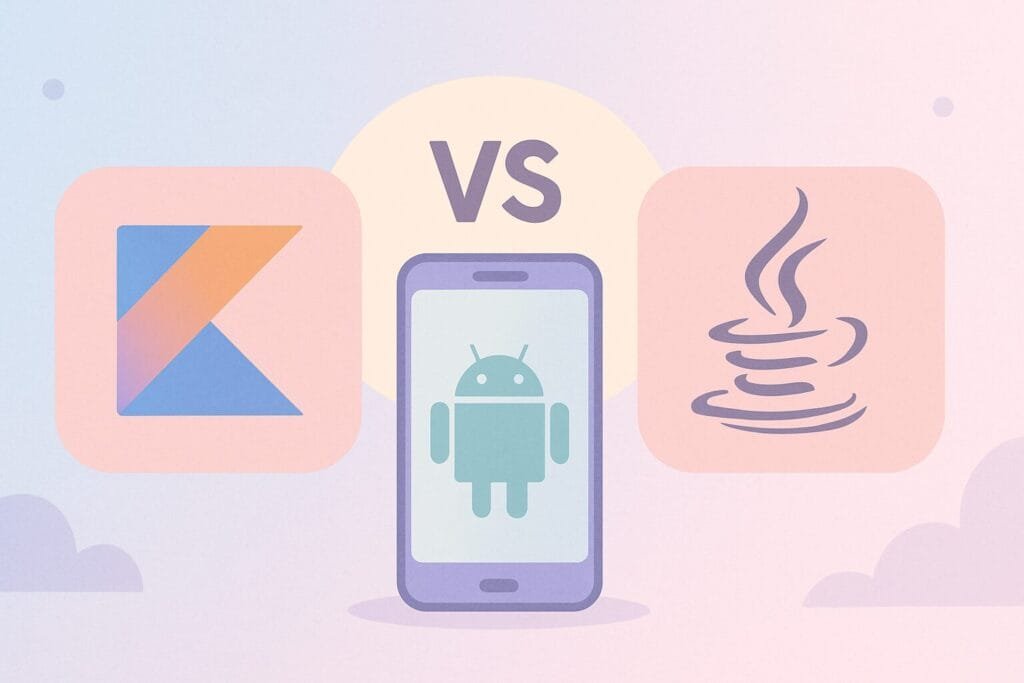As we step into 2025, Android app development continues to evolve, and developers are often caught between two powerful languages: Kotlin and Java. While both have deep roots in Android development, each brings different benefits and limitations. So, which one is the better choice for Android development in 2025?
Kotlin: The Modern Official Language

Kotlin, developed by JetBrains, became an official language for Android development in 2017. Since then, it has rapidly gained popularity for its concise syntax, null safety, and full interoperability with Java. Google has made Kotlin the preferred language for Android, promoting it in all recent documentation and tools.
Key Benefits of Kotlin:
- Concise Syntax: Less boilerplate code than Java.
- Null Safety: Helps prevent common NullPointerExceptions.
- Coroutines: Simplifies asynchronous programming.
- Interoperability: Can call Java code directly and vice versa.
- Modern IDE Support: Fully supported in Android Studio.
Kotlin encourages writing clean, readable, and maintainable code. Features like extension functions, data classes, and smart casts make development smoother and faster.
Java: The Veteran Language
Java has been the foundation of Android since the beginning. Many legacy applications, SDKs, and libraries are still written in Java. It remains a reliable, well-documented, and widely taught programming language. For teams with a strong Java background or dealing with older codebases, Java may still be the practical choice.
Key Benefits of Java:
- Mature Ecosystem: A vast number of libraries and frameworks.
- Widespread Knowledge Base: Easier to find Java developers.
- Performance: Comparable runtime performance to Kotlin.
- Backward Compatibility: Ideal for maintaining legacy code.
However, Java lacks modern language features and often leads to more verbose code. Unlike Kotlin, it doesn’t offer null safety out-of-the-box, and asynchronous programming requires more boilerplate.
Kotlin vs Java: Feature Comparison
| Feature | Kotlin | Java |
|---|---|---|
| Official Android Support | Preferred by Google | Supported |
| Syntax | Concise | Verbose |
| Null Safety | Built-in | Requires manual handling |
| Interoperability | Full with Java | Full with Kotlin |
| Learning Curve | Moderate | Beginner-friendly |
| Community & Resources | Growing rapidly | Large and mature |
| Coroutines | Native support | Needs extra libraries |
Which Should You Choose in 2025?
If you’re starting a new Android project in 2025, Kotlin is the better option due to its modern syntax, Google-first support, and tooling improvements. It allows developers to write safer and more maintainable code with fewer lines.
However, Java remains relevant for maintaining older applications, leveraging long-standing libraries, or working with teams deeply invested in the Java ecosystem.
Still unsure? JetBrains, the creators of Kotlin, offer a comprehensive guide on migrating from Java to Kotlin that can help you transition effectively.
Conclusion
In 2025, Kotlin leads the way as the best choice for modern Android development. It enhances productivity, reduces bugs, and aligns closely with Google’s roadmap. Java still has its place, but Kotlin is clearly the future.

